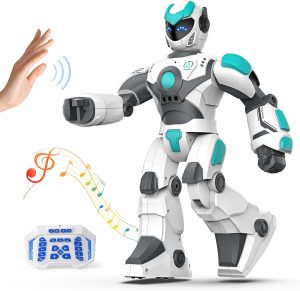Samsung Revolutionizes Home Appliances with AI Integration

In a bold move towards the future, Samsung is embedding artificial intelligence (AI) into everyday household devices like refrigerators and washing machines. These advancements promise to cut down on energy usage and tackle issues like food waste.
Imagine a fridge that suggests recipes and a washing machine that fine-tunes itself. Samsung is not just reimagining convenience; they are stepping up to address larger environmental concerns. These innovations bring a futuristic spin to household chores, potentially redefining how we interact with home appliances.
Innovations in Home Appliances
Samsung is integrating artificial intelligence (AI) into its home appliances, with notable innovations in refrigerators, washing machines, and robot vacuums. These enhancements aim to reduce energy consumption and address common household issues like food waste.
The new AI-equipped refrigerator comes with cameras that scan and track food items as they enter the appliance. This technology allows the fridge to generate recipes based on available ingredients and notify users when items are nearing their expiration dates.
AI in Washing Machines and Robot Vacuums
Samsung’s washing machines now employ AI to optimize washing cycles according to the load size, which can significantly reduce energy usage. The washing machine adjusts its performance based on the amount of clothes being washed, making the process more efficient.
The AI Jet Bot Combo, a new robot vacuum from Samsung, goes beyond simple cleaning tasks. It uses a machine-learning model to recognize objects like people or pets, allowing it to navigate the home more effectively. For example, users can instruct the vacuum to locate a pet within the house.
These AI features aim to offer more than just convenience; they also promise substantial energy savings. The refrigerator can adjust its cooling performance and the washing machine can fine-tune its cycles, both of which contribute to a lower energy footprint.
Security and Privacy Measures
Given the privacy concerns surrounding AI, Samsung has implemented robust security measures in its new appliances. The company ensures that all user data, including photographs and 3D maps created by the vacuum, are encrypted.
Users must opt-in to activate these AI features, providing them with control over their data privacy. Samsung’s stringent security standards have been approved by independent security companies, adding an extra layer of trust for consumers.
According to Samsung UK marketing director Tanya Weller, the focus is on creating features that make a meaningful difference to customers. The company avoids adding AI for the sake of novelty, instead prioritizing practical applications that enhance everyday living.
Collaboration with Energy Providers
Samsung is collaborating with British Gas and other energy providers to optimize the energy consumption of its appliances. For instance, a dishwasher might start its cycle at off-peak times, such as 11 PM, to take advantage of greener electricity sources.
This collaboration aims to make household appliances more sustainable by reducing their energy footprint. The goal is to achieve not just cost savings, but also a positive environmental impact.
Moreover, several of these AI-based energy features can be retrofitted to older Samsung devices. Those equipped with WiFi will receive updates that enable these new functionalities, extending the benefits of AI even to existing customers.
The Broader Implications of AI Integration
Samsung’s AI innovations are part of a larger trend within the technology industry to embed artificial intelligence in everyday devices. This movement is driven by the potential benefits in terms of efficiency, convenience, and energy savings.
However, the increasing presence of AI in homes also raises ethical and privacy questions. There is ongoing debate about the extent to which AI can, and should, be integrated into daily life. The transparency and control offered to users by companies like Samsung will be crucial in navigating these concerns.
In this context, Samsung’s approach to allowing users to opt-in and easily withdraw their consent for AI features is a positive step towards addressing these issues. The future success of AI-integrated home appliances will depend on maintaining this balance between innovation and user trust.
Future Prospects and Updates
Samsung commits to providing ongoing updates to its AI-integrated appliances, ensuring they remain cutting-edge. This commitment extends to both new and existing devices, making it a long-term investment for consumers.
The company’s continuous collaboration with energy providers suggests that more advanced energy-saving features are likely to be developed in the future. These improvements will further enhance the sustainability and efficiency of household appliances.
As AI technology evolves, Samsung will likely introduce even more sophisticated features, pushing the boundaries of what home appliances can achieve. Consumers can expect their appliances to become increasingly smarter and more intuitive over time.
Consumer Impact and Reception
The reception of these AI-integrated appliances by consumers remains to be fully seen. However, the promise of greater convenience, energy savings, and enhanced functionality is likely to attract significant interest.
Consumers are becoming more environmentally conscious, and the energy-saving capabilities of these appliances will appeal to this growing demographic. The ability to remotely update older devices also adds value, making these AI features accessible to a wider audience.
Ultimately, the success of Samsung’s AI appliances will depend on their real-world performance and the tangible benefits they offer to users. If they deliver on their promises, they could set a new standard for the future of home technology.
Overall, Samsung’s integration of AI into home appliances like refrigerators, washing machines, and vacuum cleaners represents a significant step towards a more energy-efficient and convenient lifestyle. With these innovations, users can look forward to reducing their energy consumption and minimizing food waste.
While concerns about privacy and data security persist, Samsung’s focus on user control and stringent security measures help mitigate these issues. By allowing users to opt-in and out of AI features, the company ensures transparency and trust.
As technology advances, the future of home appliances seems increasingly intertwined with AI, promising even more groundbreaking features that will continue to enhance everyday living. Samsung’s ongoing commitment to updating and improving its devices points to a future where homes are not only smarter but also more sustainable.





